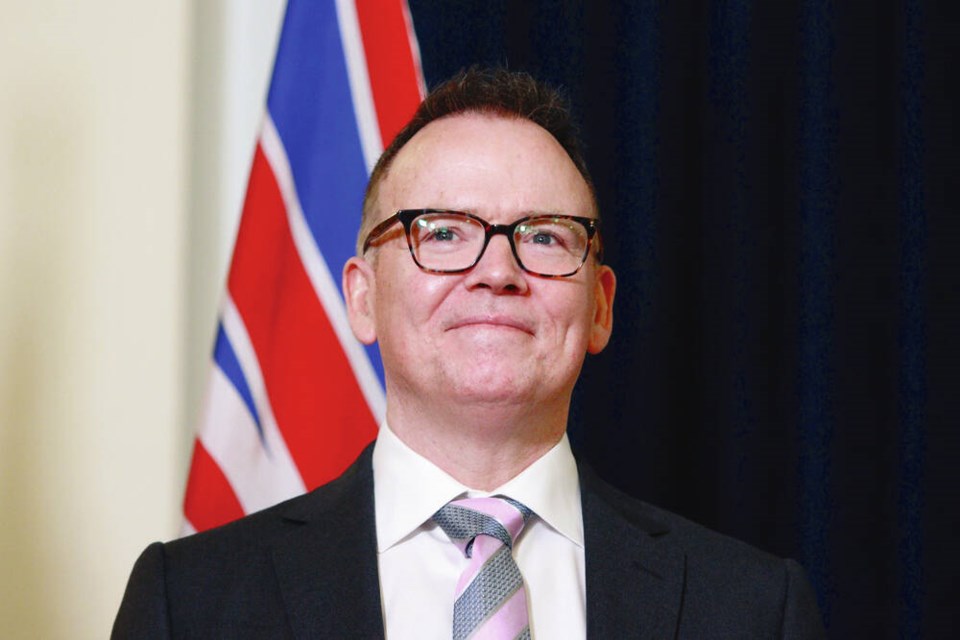B.C. Liberal Leader Kevin Falcon says a Liberal government would take a more recovery-oriented approach when it comes to addiction, with an accessible, no-cost system for anyone seeking help.
The price tag would be $1.5 billion over three years, including $995 million in treatment and recovery options, including $350 million for complex mental-health support, $100 million for homelessness and $525 million in capital funding.
“A government under my leadership will immediately expand free and accessible treatment and recovery options,” Falcon said at a news conference in New Westminster on Thursday, adding his mental health and addictions plan would roll out within the first 90 days of a Liberal government.
It’s the first major election-platform announcement for the party.
The B.C. Liberals say they would invest $150 million a year to expand access to addiction treatment beds by eliminating user fees at not-for-profit facilities and contracting with licensed private treatment operators to directly fund the cost of residential addiction treatment to eliminate waitlists.
Falcon said a B.C. Liberal government would also implement involuntary care as a last-resort approach for those at greatest risk of harm.
“We recognize there are some cases that require this type of intervention and support for both adults and youth.”
Falcon cited models like the Red Fish Healing Centre, on the lands of Riverview Hospital, a former secure facility for mental-health patients. It treats patients with severe and complex mental-health and addictions problems in a caring and compassionate way.
The B.C. Liberals say they would dramatically expand that centre by tripling the beds at the existing site, and adding four new complex-care regional facilities, including one on Vancouver Island, for about 2,200 British Columbians needing specialized mental-health treatment closer to home.
They say a Liberal government would also build five regional recovery centres where residents could receive more individualized long-term treatment, including Indigenous-specific care for up to a year.
Legislation would be needed to allow for 24/7 involuntary treatment of youth and adults in addiction crisis who pose a risk of harm to themselves or others, Falcon said.
B.C. Premier David Eby introduced the idea of using involuntary care last year as part of the government’s approach to repeat violent offenders, but has not made any announcements on it since being sworn into office.
Last year, the B.C. Civil Liberties Association — for which Eby previously served as executive director — slammed Eby’s suggestion, saying it would violate the Charter of Rights.
The association noted that in the spring of 2022, the NDP government abandoned Bill 22 because of “the trauma associated with holding youth against their will, especially Indigenous youth.” Bill 22 would have allowed youth to be involuntarily kept for up to seven days after an overdose.
The B.C. Liberals’ platform announcement follows this week’s launch of a three-year drug decriminalization pilot project in the province that allows users to possess small amounts of illegal drugs — 2.5 grams of illicit opioids such as heroin and fentanyl, as well as crack cocaine, ecstasy and methamphetamines — in an effort to stem the tide of toxic overdose poisonings.
Falcon said he supports decriminalization and harm reduction — including drug-checking and overdose-prevention sites — but they should be part of a comprehensive approach.
“My concern with this government is they’re entirely focused on going down the harm-reduction path, and frankly, minimizing or dismissing treatment and recovery,” said Falcon. “Breathing and being alive should not be our measure of success.”
About 11,000 people have died since toxic drug poisonings were declared a public health emergency in 2016.
In response to the platform announcement, Bob D’Eith, NDP MLA for Maple Ridge-Mission, said the previous B.C. Liberal government that included Falcon made cuts to mental health and addictions services that contributed significantly to the current crisis in the streets.
“The truth is that our government invests more in treatment and recovery than on harm reduction, and we are continuing to expand treatment and recovery spaces,” D’Eith said in a statement.
This week, chief coroner Lisa Lapointe released overdose figures for 2022, showing 2,272 people died from toxic drugs in B.C. last year.
It’s the second-largest death toll ever in a calendar year, and is expected to increase as investigations are finished and final causes of death are determined.
Greater Victoria, Nanaimo, Vancouver, Kamloops, Kelowna, and Prince George all recorded more illicit drug-related deaths in 2022 than in any previous year. Lapointe says drug toxicity remains the leading cause of unnatural death in B.C., second only to cancers in terms of years of life lost.
Mental Health and Addictions Minister Jennifer Whiteside said this week the province has added 320 treatment beds since the NDP took office in 2017, for a total of 3,260 publicly funded substance-use beds in B.C.
The government has taken advice from everything from coroner’s reports to death review panels, and an all-party committee on the toxic drug supply, said Whiteside.
“We need to continue to scale up treatment and supports, which we are doing,” said Whiteside. “Literally every week we are scaling up services and investing and supporting our harm-reduction approach as well.”



